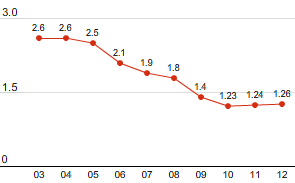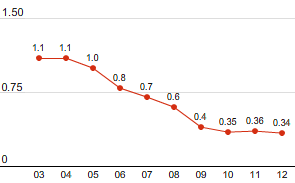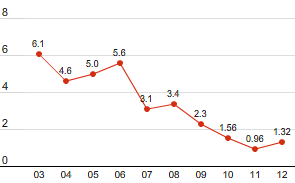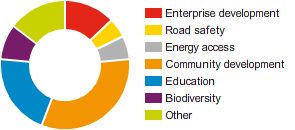Total recordable case frequency (TRCF)injuries per million working hours

Personal safety
Following steady improvements in our safety performance in recent years, in 2012 we remained close to our lowest-ever number of injuries per million working hours, the total recordable case frequency (TRCF). We achieved our lowest-ever rate of injuries that led to time off work in 2012, the lost-time injury frequency (LTIF).
Sadly, however, eight people lost their lives while working for Shell in 2012. This was two more than in 2011. Three fatalities were industrial accidents during construction and operations, two were armed attacks in Nigeria, two were road transport incidents, and one was an occupational illness related to air travel. Our fatal accident rate (FAR) – the number of fatalities per 100 million hours worked – worsened in 2012 compared to 2011, when we achieved the lowest FAR that Shell has recorded.
Lost time injury frequency (LTIF)injuries per million working hours

Fatal accident rate (FAR)fatalities per 100 million working hours

Process safety
At Shell, we place great emphasis on process safety management. This means making sure our facilities are well designed, well operated and well maintained, so that they can run safely, without harm to people or the environment. We have rigorous controls in place and monitor indicators that focus on the strength of these controls to prevent incidents.
We follow industry standards for measuring process safety performance. In 2012, we recorded 91 Tier 1 process safety incidents (as defined in line with oil and gas industry guidelines) related to our operations, an improvement compared to 2011. We investigate and learn from these incidents in order to improve our performance.
VOLUNTARY SOCIAL INVESTMENT IN 2012proportion of spend

Social performance
Social performance involves working with communities to share the benefits of our activities and to reduce the impact of our operations. It includes helping to build local economies through the creation of jobs and business opportunities. In 2012, we created new opportunities for communities and local companies in a number of countries where we operate, including Iraq and Nigeria.
We continued to implement our standards for social performance across the company in 2012. Each year we review the extent to which our operations, as well as our contractors and suppliers, have processes in place to prevent violations of human rights – for example, the use of child or forced labour. We continued to strengthen our capability in social performance in 2012 by standardising processes and through more training. In 2012, we invested further in building the competency of our staff, training 272 more employees in our social performance requirements. We also worked towards implementing new measures of our social performance.
Social investment
We aim to make our social investment projects beneficial to society in measurable ways and to be sustainable beyond Shell’s involvement. In 2012, we spent around $149 million on voluntary social investments worldwide, compared to $125 million in 2011. This rise was mainly due to increased spending in Nigeria and countries in the Middle East and North Africa. We spent $34 million on our three global strategic themes of enterprise development, road safety and energy access, and $115 million on our locally tailored programmes that cover community development, education and biodiversity. We estimate that $67 million of our spend in 2012, compared to $45 million in 2011, was in countries that according to the UNDP Human Development Index 2010 have a gross domestic product of less than $15,000 a year per person. Our figures do not include investments that are part of contractual agreements with host governments. We also provide significant support through voluntary work by Shell employees and donations of equipment.
Local procurement
Wherever possible, we buy goods and services from local businesses. In 2012, we spent over $65 billion on contracting and procurement worldwide. Around half of this was spent in the USA, the UK, Canada, the Netherlands and Nigeria. We estimate around $14 billion was spent in countries that, according to the UNDP Human Development Index 2010, have a gross domestic product of less than $15,000 a year per person. In these countries, Shell companies spent over 90% of this $14 billion with local companies. We check that our suppliers are complying with key sustainability criteria, including good working conditions. In 2012, we conducted 50 rigorous assessments of suppliers in Africa and the Middle East, 110 in the Americas, 240 in the Asia-Pacific region and 152 in Europe, to check their compliance in areas such as human rights, labour practices and business integrity.
External voluntary codes
The Shell General Business Principles and Code of Conduct guide the business activities of Shell companies. But we also support a number of external voluntary codes. These include the UN Declaration on Human Rights, the UN Global Compact, the Organisation for Economic Co-operation and Development Guidelines for Multinational Enterprises, and the International Labour Organization Declaration on Fundamental Principles and Rights at Work.
Our people
The quality of our people is essential to our business strategy. In 2012, we recruited around 1,200 graduates and 3,500 experienced professionals. Most of these new employees came from technical disciplines. Our salaries reflect market conditions in the country where employees are based and the high level of skill and experience needed. We regularly review comparative remuneration for men and women across the company. We provide flexible working practices wherever necessary and possible. Our employees are encouraged to take part in social responsibility projects and employee interest groups.
Employee communication and involvement
Two-way dialogue between management and staff is embedded in our work practices. It takes place directly and, where appropriate, via staff councils or recognised trade unions. Staff have the opportunity to understand Shell’s quarterly operational and financial results through various channels, including face-to-face gatherings with senior managers, a personal email from the Chief Executive Officer, webcasts and online publications. We have multiple channels in place for staff to report, confidentially and anonymously, breaches of the Shell General Business Principles or our Code of Conduct, or other concerns. These include a global telephone helpline and a dedicated website.
Diversity and inclusion
We have a culture that embraces diversity and fosters an inclusive work environment with equal opportunities. We measure diversity and inclusion in part by the representation of women and local nationals in senior leadership positions. By the end of 2012, the proportion of women in senior leadership positions at Shell was 16.2%, down 0.4% from 2011 and up 0.9% from 2010. In 42% of countries where we operate, local nationals filled more than half the senior leadership positions – up 8% from 2011, and up 6% from 2010. In 2012, more than 90% of our employees worldwide were local nationals.
Our annual Shell People Survey measures employees’ views on a range of topics, including the inclusiveness of their workplace. In 2012, 69% felt positive about this, up 1% from 2011 and up 3% from 2010; 12% felt negatively about inclusion in the workplace, the same as 2011 and down 1% from 2010.
Training and development
We continue to invest in developing the skills of our employees and joint-venture staff. In 2012, we invested over $280 million in training and development. Our focus is on building technical capability and safety-critical competencies and skills. In 2012, we provided more than 750,000 training days for employees and some of our joint-venture partners. This included training more than 8,500 people in leadership skills. More than 150 senior project engineers completed our externally accredited Project Academy programme that helps to improve the delivery of our major energy projects.
Code of Conduct violations
Shell employees, and contractors working for Shell, must abide by our Code of Conduct. In 2012, 209 violations of the Code of Conduct were reported (226 in 2011; 205 in 2010). As a result, we dismissed or terminated the contracts of 93 employees and contractors (78 in 2011; 77 in 2010).
